TUC Disabled Workers' conference 2024
With the announcement of a general election on July 4, the NUJ’s motion to the TUC’s Disabled Workers’ Conference in Liverpool was timely and fully supported by delegates.
It called on the TUC “to campaign for political parties to be proactive in making their events and activities accessible, including providing remote access for disabled journalists to report and participate in Q&As”.
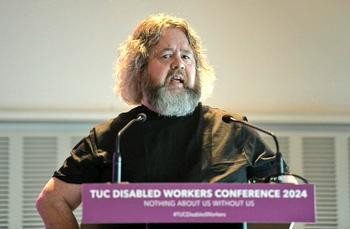
Johny Cassidy, vice-chair of the NUJ’s Disabled Members’ Council, proposing the motion, gave a big thank you to the British Sign Language (BSL) interpreters who had worked so hard during the conference. He said: “Since the Prime Minister’s soggy announcement of the date of the election, we have had statements, press conferences and press events up and down the land from Rishi Sunak, Keir Starmer and from the LibDems, the Green Party and Reform. And do you know what? No BSL at any of them.”
All too often the political fixers, he said, think about how the event will look and the headlines, but no consideration whatsoever to how they can make it accessible.
Johny ending his speech saying: “And, conference, if you do want to be able to hold whatever colour of government it is to account, you need disabled journalist in the room.”
The motion said political parties should arrange access coordinators for election events to help to achieve full inclusion.
The NUJ’s #InclusivePressAccess campaign also involves lobbying sports and broadcasting bodies to ensure that disabled sports journalists, especially in a year with the football Euros and Olympics, are guaranteed the virtual access to events and interviews they enjoyed during the pandemic, but which are now increasingly unavailable.
The NUJ’s delegation comprised president Natasha Hirst, Ann Galpin, Claire Harris, Gemma Stevenson and Johny Cassidy. They took part in a range of debates and panel sessions. Ann Galpin was re-elected to the TUC’s Disabled Workers’ Committee. She won praise from conference for her work on the committee, as a voice for disabled people and as an ambassador of the UN Convention on the Rights of Disabled People.
Labour promises
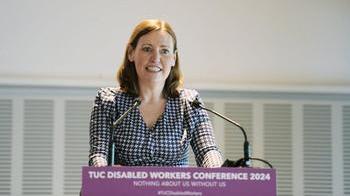
It was a perfect opportunity for Vicky Foxcroft, shadow minsiter for diabled people, to be in full electioneering mode. Noting that the UK disability employment gap stands at just under 30 per cent, and with 4.4m disabled people economically inactive, she said:
“If we win the next election, I assure you that we will act to close the employment gap.”
A Labour government, she said, would make flexible working the default from day one, strengthen statutory sick pay, and introduce mandatory reporting of the disability pay gap to companies with more than 250 employees. “Labour's Equality Act will enshrine in law the full rights to equal pay for disabled people alongside black, Asian and ethnic minority people,” she said, adding that Labour will take action to make it simpler to secure reasonable adjustments in a timely manner, including when changing jobs or when circumstances change.
Delegates had a message for the Labour Party. One said: “It is now imperative that we rid ourselves of the Tories. However, it is just as important that the Labour Party is held to account and does not repeat the mistakes of the current government. Attacks on deaf and disabled people and workers must be stopped. We need the Labour Party to embrace and work with disabled people to make the change for the better.
“Access to Work, disability benefit, and many other programmes must be fixed. The rights of disabled people and workers must be strengthened, especially in employment where we are seeing the biggest number of attacks from the employer and the Department for Work and Pensions.”
At a session looking at how disabled workers can thrive after the election, chaired by Ann Galpin, delegates were told changes need to be made with and not to disabled workers’ lives.
Social model & language
Supporting a motion by the National Education Union about language and the social model of disability, NUJ delegate Claire Harris said the social model promoted understanding and removed the fear that a person’s condition or impairment is the problem. She said the NUJ was working on guidelines for journalists so they can understand the language of inclusion and when writing stories avoid negative stereotypes about disabled people. The way disability is reported inevitably effects the way people understand disability, she said. She also took the media regulators to task for not taking sufficient steps to police inaccurate reports and those which demonised disabled people.
Government policies
In April the UN Committee on the Rights of Disabled People published a highly critical report on the UK government’s record on disabled people’s rights. Yet the report was hardly covered by the media, letting ministers off the hook.
NUJ president Natasha Hirst was part of a delegation to Geneva in March this year to witness the UN Committee scrutinising the government’s evidence on the UN Convention. She told conference:
“Within this evidence, there were personal testimonies about the real-life impact of heartless government bureaucracy that has led to deaths, suicides, and inconceivable levels of mental distress, as a result, the committee robustly questioned the government and reported on its failures. But, we aren’t seeing this kind of scrutiny in the UK press where it is desperately needed. The government is not being held to account or shamed for their failures and it empowers them to continue with their agenda.”
She said this allowed a political environment which encouraged the scapegoating of disabled people, with the government’s rhetoric designed to shift public opinion towards a narrative of disabled people being portrayed as workshy, a drain and a burden. She said the inequalities and injustices that disabled people experienced are the direct result of political choices.
The NUJ motion called on the TUC to challenge this negative rhetoric in its communications, promote the NUJ’s reporting guidelines and training for journalists and PR and communications professionals when covering disability issues, and to call for greater representation of disabled decision-makers in the media.
Long Covid
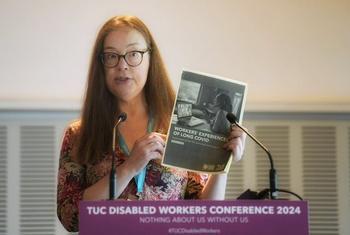
Ann Galpin seconded a motion on Long Covid which asked the TUC to promote a model survey for union activists and share successfully-negotiated agreements and best practice on reasonable adjustments for people with the condition. Ann said the movement needed to collect more evidence on how it was affecting many workers and to challenge the lack of support for workers with Long Covid.
She told conference: “The TUC’s 2023 survey of more than 3,000 workers with Long Covid found that two-thirds were in frontline jobs such as health, social care, transport, education, and retail. More than half, 52 per cent of respondents, experienced unfair treatment or discrimination because of Long Covid and 1 in 7 had lost their jobs as a result. Flexible working is the reasonable adjustment workers with Long Covid most frequently ask for, but regrettably many employers still resist.”
Personal Independence Payments
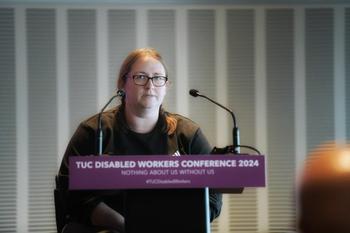
Seconding a Unite motion about personal independence payments (PIPs), which described the assessment procedures as “humiliating and dehumanising, based on a notion of one-size-fits-all, coupled with the lack of quality trained assessors", NUJ delegate Gemma Stevenson had her own nightmare experience to share with conference.
She described arriving for her PIP assessment in adapted vehicle only to find there was no accessible parking. When she eventually arrived in the room she was met with hostility and was asked why as a wheelchair user she could not use the Tube.
“Ladies and Gentlemen,” she said, “this tale is not one made up by Charles Dickens, this is my story, this is what I experienced in a PIP assessment. As someone with a visible impairment, and yes, some invisible ones too, when I got my report back it said they did not believe I had a hearing problem … not taking into account that I was lipreading. And I was told that I did not have a mobility impairment because I could understand a sat nav. That one always gets a laugh.”
Conference vote for a major rethink of the scheme, and the motion will be taken to Congress in September.
AI
Speaking to a motion about the dangers of AI on disabled workers, Natasha Hirst described to delegates how Generative AI had been trained by “scraping words, images and footage off the internet largely without permission, or payment for the creatives whose work had been stolen”, and equally as worrying, is that it often just makes things up.
“AI generated images of disabled people,” she said, “are not built on a selection of authentic, dignified and diverse photographs, instead research shows it is creating images that amplify stereotypes and it can all become about wheelchairs and not about people in them.”
However AI can be of great benefit to disabled workers, she said, by increasing accessibility, powering assistive technology and making it easy to add alt-text and visual data descriptions.
She said: “As trade unionists, we absolutely have to be alert to the risks and call on governments to regulate effectively, and employers to utilise AI for good – the voices and needs of disabled workers need to be heart of it.”
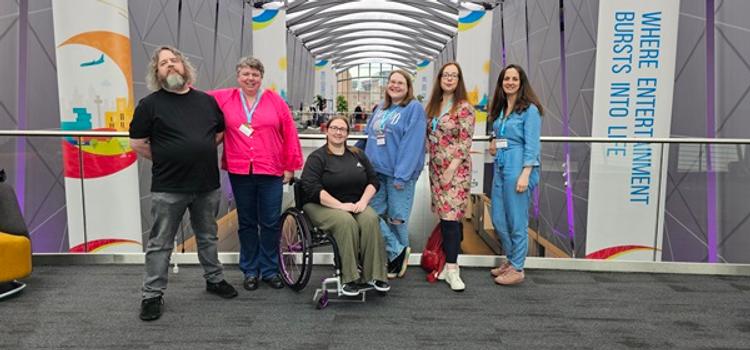
Johny Cassidy, Claire Harris, Gemma Stevenson, Polly Zaffino (NUJ observer), Ann Galpin, Natasha Hirst
© nuj
